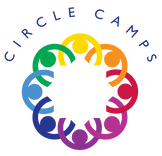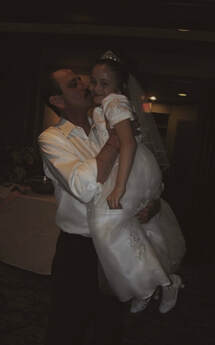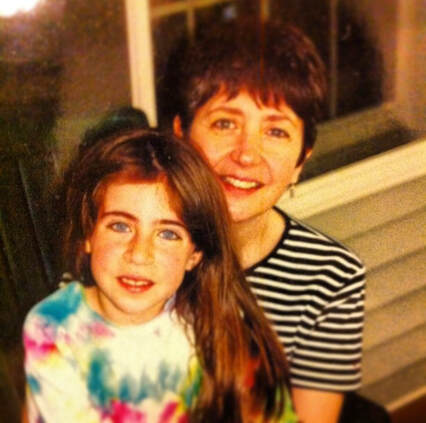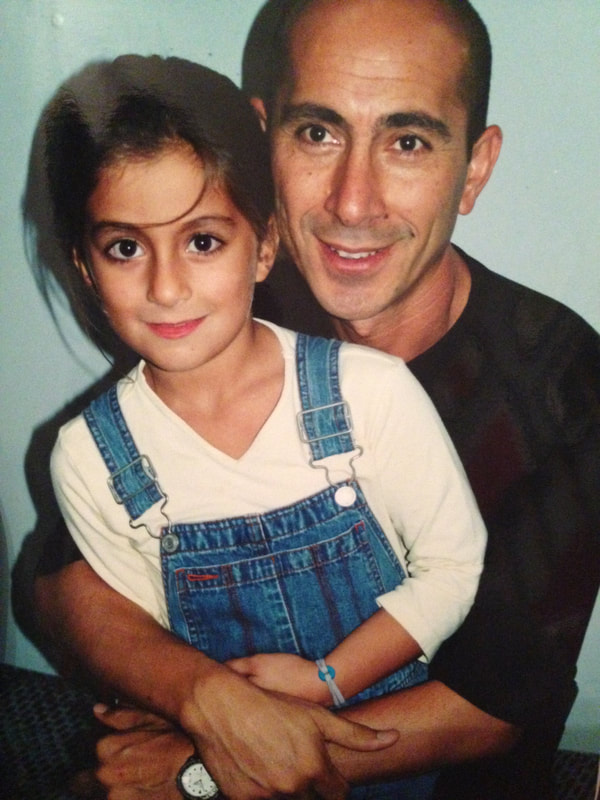|
"A Piece of Joy" by Mai R
When I was three-years-old, my dad was diagnosed with histiocytic sarcoma. I was too young to understand what that meant, but my family’s world quickly started to revolve around chemotherapy, radiation, and seemingly all corners of Mass General Hospital. Over the next few years, I added more terms to my vocabulary that set me apart from other toddlers: remission, relapse, and hospital food court. My dad fought with his blood cancer for two years before passing away when I was five. He died in the middle of the night at home where he was most comfortable and loved. I don’t think I was fully capable of understanding death at that age, but I liked to think I did. I helped pick out the Life is Good t-shirt that my dad wore when the hearse took him away. And I prided myself in knowing everything a five-year-old could about cremation, fascinated by the white cardboard box full of ashes that arrived in my parents’ bedroom. I’ve always heard that his cancer, an extremely rare variant, was just a stroke of bad luck. He left behind three bad-luck-bearers: my mom, my brother, and me. Our lives became unprecedented territory, but my brother and I were in the middle of growing up with no other option than to push forward. So at five years old, one chapter of my life closed, and a new one began. I didn’t realize that my dad was dying during those years because his presence always brought me pure, unfaltering joy. I was giddy to help him walk our three rescue dogs early each morning when our great-dane-mix was really walking me. He would make me cinnamon apple oatmeal at any hour when I couldn’t sleep, and I remember eating my one-minute-oats at midnight feeling rebellious and invincible. Even in his hospital room, he could make fun out of nothing; we spent hours in hysterical laughter, entertaining ourselves with yo-yos and little plastic cups of hospital ice cream. It’s been twelve years since my dad’s death, and it’s hardest to think about how much of my life I’ve lived without him. He never saw my first day of kindergarten or middle school or high school. He never got to hear me play my violin, or watch me learn to drive. And he’ll continue to miss more as I keep living. At 17 years old, I have more memories of my life without him than the time when he was alive. It’s easy to fall down the hole and think of everything my dad is missing; the list goes on and on. Sometimes I worry that I’m losing my connection to him as my memories become distant, but I’ve learned to remember this: my dad gave me his joy. I’m closest to him when I’m laughing, and I think of him whenever I can replicate that oatmeal-at-midnight feeling. I’ll never fully lose him because I’ll always have a piece to hold onto. So I look for the places and people that bring me his joy. I am beyond lucky to have found Circle Camps; it brought me both. Sweden, Maine provided a special corner of this planet where I could still find happiness. When my mom loaded me onto the Circle Camps coach bus for the first time, I wanted nothing to do with it. But a single mom is a strong mom, so I was going to end up at camp no matter how hard I kicked and screamed. My worries were for naught; I fell in love with camp immediately, comforted by the glittering blanket of stars and lulled into a dizzy daze after rolling down the massive hill. I met lifelong friends–girls whose words I really believed when they claimed to understand my loss. And together, we were joyous. We screamed out Lizzie McGuire songs breathlessly as the tube zigged-zagged us across the lake at full speed. We played gaga-ball more fiercely than ever before, fueled by dirt pudding and camp spirit. Every day was freeing, peaceful, perfect. Circle Camps became my safe space and my haven: a place to exude the happiness I used to feel with my dad, surrounded by pine trees, loons, and loved ones. My eight years to date at Circle at Tapawingo can’t be described as anything but complete bliss; it is my sincerest wish for everyone to find a place like Circle Camps that will fill you with happiness until you’re whole. I choose to find joy in every day because it keeps me grounded, safe, and strong. When I find my own joy, it brings me closer to my dad. I feel his presence, his laugh, and his love. It’s a simple reminder that even years after his death, I’ll never lose him. He will stay with me today, tomorrow, a year from now, always. It doesn’t matter how long you’ve been without your parent. A piece of them is a piece of you, and you’ll carry them with you wherever you go. “All that we love deeply becomes a part of us.” -Helen Keller
2 Comments
"See My Grief" by Orlagh Skafas
Although my relationship with my grief and the death of my dad have been the most inconsistent part of my life, they may have brought me to discover the most consistent part of my life, Circle Camps. I have been a member of the Circle community for nine years now. My dad died when I was nine years old from colon cancer. Although my memories of my dad are few and far between, every single one is positive. He was the most loving, caring, funny, and honest person I have known to date. He always put those he loved before himself and feeling the effects of that through my childhood, as well as noticing them as I go through life without him, has left me with the feeling of wanting to be just like him. My entire post-death life leading up to college, I have done my best to suppress my grief in the effort to be present and there for those around me. The thing is, after my dad died, I could certainly feel my grief, but it was difficult to see my grief. Whereas when I looked at my mother who just lost her best friend and the love of her life, and at my little brother who just lost his role model and his father, I saw their grief right in front of me. From that point, I bottled up my feelings and pushed them to the backburner because for me, the feelings of those I loved was the priority. Just as I cared about them, my family cared about me deeply, and making them see me as okay was what was most important to me. In high school I would go on drives just to listen to the songs that reminded me of my dad. I was a runner and would go running in places that reminded me of him. I always seemed to put myself into situations where I could allow myself to see my grief for what it was but no one else. I knew exactly what I was feeling but I did not want anyone else to see it on the outside. However, when I got to college that seemed to change. When I was at home, I had my mom and brother right there with me, seeing all their emotions. When I got to SNHU, there was no one else’s grief to watch. The only emotions were the ones I felt that I could now see right in front of me in an isolated setting. The difference now was I did not choose to be in this isolated setting. I was no longer leaving my house intentionally when I was sad to go for a drive or a run. I was now in my dorm room with no one around to witness the external effects of my grief, so it all seemed to just come out. Throughout my short time at SNHU, before Covid hit, it became apparent to me that when I got to the point where I could see my grief, I knew how to care for myself. Before that point, I was unable to regulate my emotions. I no longer had other people right in front of me to worry about, it was just me here, and it was time for me to start pulling my emotions back to the front. Each time I sat in my small dorm room at school, upset because of the dad-sized hole in my heart, I always found myself thinking of how those who loved me would feel seeing me upset like this. How would my mom who just had her first child leave home feel if she knew I was grieving this deeply alone, or my little brother who was navigating high school all for himself, or even my father who was looking down on me as I navigated my life without him. As my time at school continued, I began to notice that I saw my grief much less. I had built a number of amazing friendships with neighbors and classmates, dove into my major of elementary education, and got involved in organizations across campus from giving tours to incoming students as a Penmen Guide to planning events for our school newspaper. Being involved in the community around me and having such an amazing support system here at school has helped me get closer to a place where I am prioritizing myself when I need to over others. Being lifted to a better place through these things in my life made me truly realize how precious life is. We only get one life, and we should not live it fearfully. For me, the only place where I truly felt fearless was when I was at Circle, surrounded by those who understood what I was going through. Now I have realized it doesn’t matter if those in my day-to-day life really understand what I am going through, because they care about me for me. Leaving for school was scary and exciting at the same time. I always knew these were my years to become myself and find my way. Being alone forced me to prioritize my feelings over those around me, and although I still care deeply for those I love, my feelings need to be my number one concern. The ones who love me would never want to know I had been grieving this way. We should live our lives to bring ourselves joy; we should take up space where we deserve; we should take risks as we see fit and be endlessly good to ourselves; we should show those around us effortless love. Through taking care of myself when I felt I needed it, rather than only worrying about others, I was able to heal the parts of myself that were preventing me from being present in life, in my relationships, and in my grief. Our feelings deserve to be felt. We need to give our sadness and anger and grief room to move just as much as we allow happiness. The dark clouds need to pass before the sun can shine. “Enjoy the little things in life, for one day you’ll look back and realize they were the big things.” - Kurt Vonnegut "Full Cup" by Katrina Erni
I’ll never forget sitting in the large room of the ICU, surrounded by nurses and neurosurgeons as they told us the devastating news. My mom had been diagnosed with a rare and aggressive form of brain cancer following emergency surgery for an aneurysm she had suffered a few days before. I remember my aunt and my mom’s oncologist putting their arms around either side of me. When we heard that the test results were in, I had offered to take notes - instead, I choked back tears as they explained that my mom’s life expectancy was somewhere between 1 and 5 years. The walk back to my car later that night was one of the most surreal experiences of my life. This was January of 2016 and my mom passed away just over two years later. Those two years were incredibly difficult. The bad days were super rough, and the good days were tinged with a new, bittersweet feeling that colored everything. The long, slow loss of someone who you love more than anything, watching them struggle and decline, is indescribable. I began to struggle with anxiety and depression and felt scatterbrained and flaky for the first time in my life. During this time, maybe a year or so into my mom’s diagnosis, I began talking to a therapist. Sometimes I would talk about my mom. Sometimes about my love life. A lot of the time, I just complained about work. One of the most helpful things she told me is that when your cup is already full, adding the smallest additional drop can cause it to overflow. My anxiety would usually spiral over something relatively small - a mistake at work, a friend forgetting to text me back - but those small things could cause an emotional flood given everything else I was dealing with. After my mom passed away, I had amazing support from family and friends but I continued to struggle with my mental health. Racing thoughts, paralysis from fear of being anything less than perfect, and crying myself to sleep more often than I’d like to admit are just a few examples. Therapy helped in the short term but didn’t seem to move the needle overall. Finally, I went to see a psychiatrist - the same psychiatrist who had treated my mom - and she prescribed antidepressants in late 2019. This was a huge breakthrough for me. I didn’t stop feeling sad about my mom, my grief didn’t go away, but the weight of all those things that I had been carrying lifted somewhat. My mind stopped racing and I stopped feeling so alone. Medication certainly isn’t for everyone but for the year and a half that I was on it, my SSRI helped me bridge the wide gap between grief that felt like it was spiraling out of control to grief that is now perfectly manageable. Telling people that it gets easier is a cliche for a reason. I miss my mom all the time, but it doesn’t get in the way of my life or my wellbeing. My memories of my mom no longer revolve around her illness. I think more and more about the fun we used to have and it brings a smile to my face instead of tears to my eyes. Nowadays, I can talk about my mom, even her illness and death, without getting a lump in my throat. For anyone reading this who is struggling with their mental health after losing a parent, I’m here to tell you to seek help if you need it - lean into your support network, whether that’s friends and family or an amazing organization like Circle, talk to a therapist, and consider working with a psychiatrist if you feel like you need that extra push. All three of those things, over time, helped me emerge from a very difficult period and allowed me to start living a life that I love. "Heart to Heart" by Julia Khligh
When my dear friend Ricky asked me to contribute a piece to the Circle Camps website, I was immediately overcome with gratitude and appreciation. Something so near and dear to her and her family’s hearts, she wanted to let me put my mark on. I knew I would never forget this unique opportunity. Further, and maybe selfishly, would this allow me to tie a nice pretty ribbon on my own grief that still plagues me 8 years later? Circle Camps was introduced to me about a year and half ago, and it’s one of those foundations that is so specific it could easily be overlooked, yet it is so impactful to a very real and existing audience you literally can’t believe that it doesn’t exist on a larger scale. The loss of a parent is prevalent, and tragically, I would take a guess that the statistics have deepened after the events of the last two years. I have frequently let my mind wonder what my life would be like had Circle Camps been around in my earliest time of need. Would I have felt a little less despair on the days that I couldn’t imagine being able to genuinely laugh again? Would I have found lifelong friends who could understand my pain with just a look? Would navigating this dark and precarious journey have been made just a bit easier had I found a support system early on? Loss first knocked at my door when I was in middle school. I will never forget the image of my mother pulling into our driveway, inconsolable and tear stained face, as she practically shouted, “Robert died.” Her brother, my uncle, had killed himself. Though at the time, being so young and impressionable, my cousins and I were told he suffered a heart attack. A few years later, my granddad died unexpectedly in his sleep. This rocked my mother, sent shockwaves through our entire family, and things were never quite the same. And though grief was now known in my life, we weren’t best friends. I could explain away and rationalize these tragedies. My uncle struggled with his mental health his entire life, my granddad lived to be in his eighties with an adoring wife and family that he treasured, so it was a life well spent. I wouldn’t really know grief for another year and a half, when my dad unexpectedly died from cancer. Just a few months past my 20th birthday, on New Years Eve, I awoke to a call that my dad had stage 4 lung cancer, he didn’t have much time to live, and we needed to see him immediately. I was absolutely spinning. And as my mom took over and hurriedly began booking our flights, she asked me if I wanted to fly out tonight or first thing in the morning. Hardly able to form a sentence, I blubbered “the morning please.” I was under the impression that we were looking at a couple of months left, maybe weeks if we were unlucky, and this would give me just a few hours to wrap my head around what was happening before I had to face what I imagined to be a completely deteriorated version of the once strong and healthy man I knew. My parents were divorced for some years, and we lived in a different state from my dad; seeing him on holidays, and spending large chunks of the summer with him. It was my second year of college and being so busy with school and summer jobs, I hadn’t seen him as much as usual, which allowed him to hide his illness from me and my sister. Hours later, all I had done was curl up and cry. I had to get out of the house and slip away from the dark cloud that was hovering over all of us. A searing headache had formed, and my stomach grumbled. Surely I could force down a few bites of food to feel somewhat functioning. I was in the car on the way to pick up dinner for all of us, just minutes down the road from home, when my sister called, screeching “he’s gone, dad’s dead.” I pulled over immediately, and began dry heaving onto some poor stranger’s lawn. When I look back at the years and months that would follow, I remember them with a gray lens. My days and nights always appeared dreary and colorless. I was in a relationship at the time, a quite unhealthy one, and my boyfriend had the emotional range of a Kardashian - essentially useless when it came to consoling me. My sister was four years younger than I, so I wanted to be her shoulder to lean on. My mom had lost her father so recently, and unfortunately, this topic dredged up her own unresolved issues with him. Bringing up my dad, I felt, was painful for her. My closest friends were all at their respective colleges in other towns, and while they did their best to comfort me, none of them (thankfully) had lost a parent before. There was only so much they could do. I was the most alone I had and would feel in my entire life. I was lucky enough that my mom suggested and was able to afford therapy, which I quickly took her up on. Fast forward to my present life. I have a very close relationship with all of my family members and a few cherished friends, as well as a new boyfriend who lends tremendous support daily. And while I am always happy to share my story, the pain feels as fresh and sharp as if it happened yesterday. I look back on this time, when things were their most raw and ugly form, and I still experience a lot of unresolved feelings and anxiety. The age-old advice about time and its healing powers does hold some merit. You learn to cope. Life doesn’t wait for you, so you must adapt and learn to grow with your grief. And while I do believe it is up to me and anyone suffering a loss to make our own peace, outside support is invaluable to a broken heart. Having something as transformative as Circle Camps would have altered my life for the better, and I hope the next person who reads this and may be feeling hopeless, knows that there are many of us out here looking to fill that missing piece of our heart. |
The Circle BlogWhere people in our community can come together and talk about their grief. Archives
May 2022
Categories |
Circle Camps is a 501(c)(3) organization incorporated in 2002 in the Commonwealth of Pennsylvania
Circle Camps is also registered as a foreign non-profit organization in 2020 in the State of Georgia. Circle Camps is also registered as a foreign non-profit organization in 2023 in the State of Wisconsin.
Privacy policy - Cookie policy
Circle Camps is also registered as a foreign non-profit organization in 2020 in the State of Georgia. Circle Camps is also registered as a foreign non-profit organization in 2023 in the State of Wisconsin.
Privacy policy - Cookie policy





 RSS Feed
RSS Feed